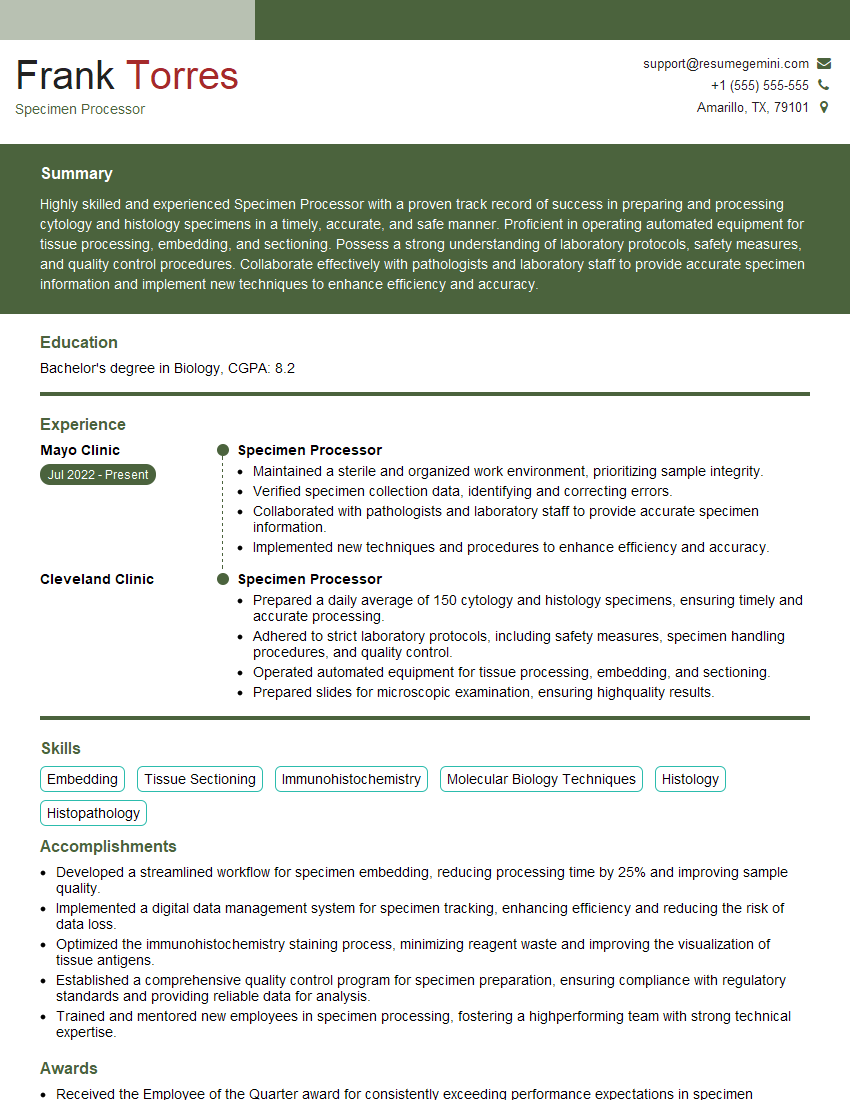Are you a seasoned Specimen Processor seeking a new career path? Discover our professionally built Specimen Processor Resume Template. This time-saving tool provides a solid foundation for your job search. Simply click “Edit Resume” to customize it with your unique experiences and achievements. Customize fonts and colors to match your personal style and increase your chances of landing your dream job. Explore more Resume Templates for additional options.

Frank Torres
Specimen Processor
Summary
Highly skilled and experienced Specimen Processor with a proven track record of success in preparing and processing cytology and histology specimens in a timely, accurate, and safe manner. Proficient in operating automated equipment for tissue processing, embedding, and sectioning. Possess a strong understanding of laboratory protocols, safety measures, and quality control procedures. Collaborate effectively with pathologists and laboratory staff to provide accurate specimen information and implement new techniques to enhance efficiency and accuracy.
Education
Bachelor’s degree in Biology
June 2018
Skills
- Embedding
- Tissue Sectioning
- Immunohistochemistry
- Molecular Biology Techniques
- Histology
- Histopathology
Work Experience
Specimen Processor
- Maintained a sterile and organized work environment, prioritizing sample integrity.
- Verified specimen collection data, identifying and correcting errors.
- Collaborated with pathologists and laboratory staff to provide accurate specimen information.
- Implemented new techniques and procedures to enhance efficiency and accuracy.
Specimen Processor
- Prepared a daily average of 150 cytology and histology specimens, ensuring timely and accurate processing.
- Adhered to strict laboratory protocols, including safety measures, specimen handling procedures, and quality control.
- Operated automated equipment for tissue processing, embedding, and sectioning.
- Prepared slides for microscopic examination, ensuring highquality results.
Accomplishments
- Developed a streamlined workflow for specimen embedding, reducing processing time by 25% and improving sample quality.
- Implemented a digital data management system for specimen tracking, enhancing efficiency and reducing the risk of data loss.
- Optimized the immunohistochemistry staining process, minimizing reagent waste and improving the visualization of tissue antigens.
- Established a comprehensive quality control program for specimen preparation, ensuring compliance with regulatory standards and providing reliable data for analysis.
- Trained and mentored new employees in specimen processing, fostering a highperforming team with strong technical expertise.
Awards
- Received the Employee of the Quarter award for consistently exceeding performance expectations in specimen processing.
- Recognized for exceptional accuracy in tissue fixation and preservation, resulting in highquality specimens for research and diagnostic purposes.
- Received commendation for the development of an innovative method for paraffinembedded tissue sectioning, improving tissue integrity.
- Recognized for outstanding performance in gross dissection and tissue collection, contributing to accurate pathological diagnoses.
Certificates
- ASCP MT
- NCA
- HIQA
- IHC Specialist
Career Expert Tips:
- Select the ideal resume template to showcase your professional experience effectively.
- Master the art of resume writing to highlight your unique qualifications and achievements.
- Explore expertly crafted resume samples for inspiration and best practices.
- Build your best resume for free this new year with ResumeGemini. Enjoy exclusive discounts on ATS optimized resume templates.
How To Write Resume For Specimen Processor
- Highlight your expertise in specimen preparation techniques, including embedding, tissue sectioning, and immunohistochemistry.
- Demonstrate your proficiency in molecular biology techniques, such as PCR and DNA extraction.
- Emphasize your understanding of histopathology and the ability to interpret slides.
- Showcase your ability to work independently and as part of a team in a fast-paced laboratory environment.
Essential Experience Highlights for a Strong Specimen Processor Resume
- Prepare cytology and histology specimens for microscopic examination, ensuring timely and accurate processing.
- Adhere strictly to laboratory protocols, including safety measures, specimen handling procedures, and quality control.
- Operate automated equipment for tissue processing, embedding, and sectioning, ensuring high-quality results.
- Prepare slides for microscopic examination, ensuring high-quality results.
- Maintain a sterile and organized work environment, prioritizing sample integrity.
- Verify specimen collection data, identifying and correcting errors.
- Collaborate with pathologists and laboratory staff to provide accurate specimen information.
- Implement new techniques and procedures to enhance efficiency and accuracy.
Frequently Asked Questions (FAQ’s) For Specimen Processor
What is the primary role of a Specimen Processor?
The primary role of a Specimen Processor is to prepare and process cytology and histology specimens for microscopic examination in a timely, accurate, and safe manner.
What are the educational requirements for becoming a Specimen Processor?
A Bachelor’s degree in Biology or a related field is typically required to become a Specimen Processor.
What are the key skills required for a Specimen Processor?
Key skills for a Specimen Processor include expertise in specimen preparation techniques, proficiency in molecular biology techniques, understanding of histopathology, and the ability to work independently and as part of a team.
What is the job outlook for Specimen Processors?
The job outlook for Specimen Processors is expected to be good, with a projected 10% growth in employment from 2020 to 2030.
What is the average salary for a Specimen Processor?
The average salary for a Specimen Processor in the United States is around $45,000 per year.
What are the career advancement opportunities for Specimen Processors?
Specimen Processors can advance their careers by becoming supervisors, laboratory managers, or pathologists.